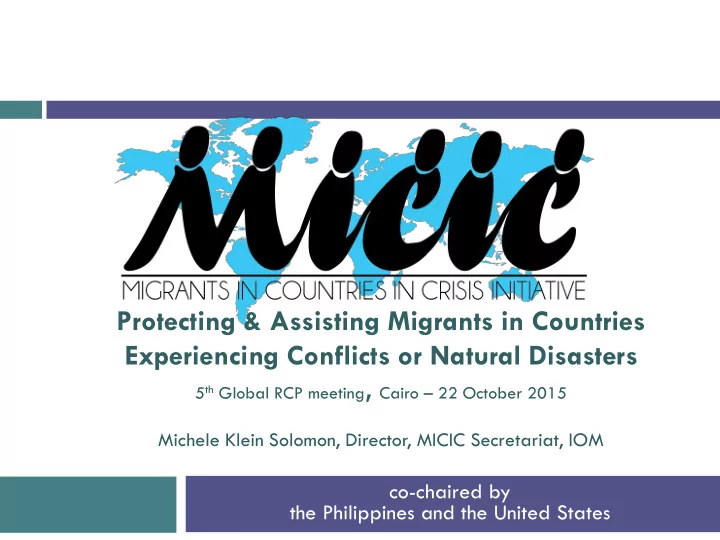

Protecting & Assisting Migrants in Countries Experiencing Conflicts or Natural Disasters 5 th Global RCP meeting , Cairo – 22 October 2015 Michele Klein Solomon, Director, MICIC Secretariat, IOM co-chaired by the Philippines and the United States
2011 Libya Crisis February-June 2011civil strife Nearly 800,000 migrants fled Libya Most from neighboring countries – 45% were comprised of 120 nationalities All in need of assistance; many in need of protection and evacuation Other impacts: • Challenges for home countries – evacuation, return, and reintegration • Challenges for migrants – livelihoods, reintegration, and empowerment • Challenges for Libya/country in crisis – economy, skills, and services
2011 Japan Crisis March 2011 earthquake and tsunami Approx. 700,000 foreigners in areas affected by earthquake and tsunami (and nuclear accident) 531,000 foreigners left Japan in the month after the earthquake and tsunami From diverse countries, within and outside the region, including Brazil, China, Malaysia, Philippines, South Korea, and Taiwan Effective communication essential for emergency assistance
Why Migrants? Specific Vulnerabilities and Circumstances Pre-existing vulnerabilities Unable to leave the country in crisis Unwilling to leave the country in crisis Unable to access humanitarian assistance Unable or unwilling to return to country of origin Subjected to discrimination, targeted attacks, or exploitation
Objectives of the MICIC Initiative Protect Rights Save Lives Address Impacts and Dignity Better preparation More effective responses Better recovery Non-binding principles, guidelines, and effective practices
Scope of MICIC Initiative Which Crises? Which Phases? Which Migrants? In country when crisis hits Temporarily or permanently Conflict Pre-Crisis Regardless of legal status and/or ≠ Not personal crises Emergency Natural Can include: Post-Crisis Disasters Migrant workers and families Tourists, business travelers, students, and diplomats Victims of human trafficking and smuggled persons Marriage migrants = All Phases ≠ Economic ≠ Employment Outcomes will not replace existing frameworks or ≠ Other mechanisms
What We Are Learning So Far Respect for Data, tracking, and contact Standing arrangements on human and labor information on migrants evacuation, consular rights, and ethical assistance, coordination etc. recruitment Contingency Crisis planning/DRR alert Non- Evacuation and return Save systems refoulement services lives Emergency funds and Open borders, humanitarian insurance Identification and Referral border management and schemes Systems temporary admission Services upon return - Back pay, outstanding Re-migration and livelihood creation, health, wages, return of other mobility psychosocial counselling opportunities property, remains
Looking Forward
Engage
Help us protect the rights and dignity of migrants caught in countries in crisis Stay informed; join the discussion; generate knowledge
Recommend
More recommend